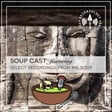
Advertising or Accountability? Archaeology Needs Critical Friends in The Media! - WB 12th Oct 2021
Welcome to Watching Brief. As the name implies, each week Marc (Mr Soup) & Andy Brockman of the Pipeline (Where history is tomorrow's news) cast an eye over news stories, topical media and entertainment and discuss and debate what they find.
Support us on Patreon: https://www.patreon.com/archaeosoup
0:00 Introduction
4:19 How We Began
11:55 Being a Critical Friend
18:17 Other Voices & The ‘Soul’ of Archaeology 27:00 Conclusions
Link of the Week:
Watching Brief - Jan 2017:
https://youtu.be/K2ytK6ar-ds
Links:
Archaeoscoop: Richard III: It's Him!
The ‘Sun’ article is no longer online, but:
Head of 'Geordie Roman god' found at Binchester:
https://www.bbc.co.uk/news/uk-england-tees-23164533
Archaeologists Find Ancient Stone Head Which Could Be Roman Geordie God:
https://www.theguardian.com/uk-news/2013/jul/04/stone-head-roman-geordie-god
Cameron Appointed Peer, MOD and Odyssey Colluded over Balcehn’s HMS Victory:
Springtime for Hitler and “N@zi War Diggers”:
https://www.heritagedaily.com/2014/03/springtime-for-hitler-and-nazi-war-death-porn-diggers/102632
Assumed Missing – Reported Buired – the Search for the Lost Spitfires of Burma:
The Buried Spitfires of Burma: A ‘Fake’ History:
https://www.hive.co.uk/Product/Andy-Brockman/The-Buried-Spitfires-of-Burma--A-Fake-History/24703841
High Court sets Stonehenge Tunnel on Road to Nowhere! What Happens Next? - WB 31st July 2021:
Sheffield Shock Closure: Staff & Students Speak! - WB 27th May 2021
Sheffield University "Disposed of" Key Documents During Archaeology Dept Review - WB 12th June 2021:
“The Future of Our Past is Family" - Worcester Graduates Speak! - WB 30th Aug 2021:
